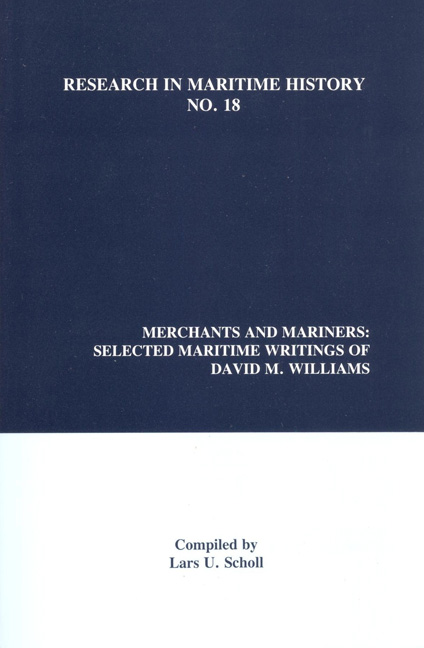Book contents
- Frontmatter
- Contents
- “Introduction”
- “David Malcolm Williams: A Tribute from an Old Friend”
- “David M. Williams and the Writing of Modern Maritime History”
- Writings
- “Abolition and the Re-Deployment of the Slave Fleet, 1807-1811”
- “Liverpool Merchants and the Cotton Trade 1820-1850”
- “The Shipping of the North Atlantic Cotton Trade in the Mid- Nineteenth Century”
- “Merchanting in the First Half of the Nineteenth Century: The Liverpool Timber Trade”
- “James Silk Buckingham: Sailor, Explorer and Maritime Reformer”
- “State Regulation of Merchant Shipping 1839-1914: The Bulk Carrying Trades”
- “Customs Evasion, Colonial Preference and the British Tariff, 1829- 1842”
- “Bulk Passenger Freight Trades, 1750-1870”
- “Henry Mayhew and the British Seaman”
- “Mid-Victorian Attitudes to Seamen and Maritime Reform: The Society for Improving the Condition of Merchant Seamen, 1867”
- '“Advance Notes' and the Recruitment of Maritime Labour in Britain in the Nineteenth Century”
- “The Quality, Skill and Supply of Maritime Labour: Causes of Concern in Britain, 1850-1914”
- “David M. Williams: A Bibliography”
“Henry Mayhew and the British Seaman”
from Writings
- Frontmatter
- Contents
- “Introduction”
- “David Malcolm Williams: A Tribute from an Old Friend”
- “David M. Williams and the Writing of Modern Maritime History”
- Writings
- “Abolition and the Re-Deployment of the Slave Fleet, 1807-1811”
- “Liverpool Merchants and the Cotton Trade 1820-1850”
- “The Shipping of the North Atlantic Cotton Trade in the Mid- Nineteenth Century”
- “Merchanting in the First Half of the Nineteenth Century: The Liverpool Timber Trade”
- “James Silk Buckingham: Sailor, Explorer and Maritime Reformer”
- “State Regulation of Merchant Shipping 1839-1914: The Bulk Carrying Trades”
- “Customs Evasion, Colonial Preference and the British Tariff, 1829- 1842”
- “Bulk Passenger Freight Trades, 1750-1870”
- “Henry Mayhew and the British Seaman”
- “Mid-Victorian Attitudes to Seamen and Maritime Reform: The Society for Improving the Condition of Merchant Seamen, 1867”
- '“Advance Notes' and the Recruitment of Maritime Labour in Britain in the Nineteenth Century”
- “The Quality, Skill and Supply of Maritime Labour: Causes of Concern in Britain, 1850-1914”
- “David M. Williams: A Bibliography”
Summary
Contemporary studies of the life and position of the British seaman in the nineteenth century are remarkably rare. If one excludes material contained in Parliamentary Papers concerned with legislative proposals and action, the material available is thin indeed for most of the century. There are, of course, numerous accounts of the sailor's lot in books aimed at juvenile readers; again there is the literature associated with various seamen's mission movements; but such accounts of the hard but wholesome life of jolly Jack Tar or alternatively of rough innocents exposed to the moral perils of the sea have little to offer in the way of serious study. More meaningful material is to be found in Thomas Brassey's British Seamen or Frank Bullen's work, published at the turn of the century, Men of the Merchant Service. And, published in the twentieth century, there are books such as those of Runciman, looking back to the days of sail. All such works, however, cover only the latter part of the Victorian era. This paper is concerned with a unique study of the British seaman in the midcentury which in the past appears to have been little known and certainly underutilized.
The study in question took the form of a collection of letters on seamen, part of a much longer series on labour in London, written by Henry Mayhew, which appeared in the daily newspaper, the Morning Chronicle, in 1850. Lest the idea of letters in a newspaper appears insubstantial, it must be pointed out that each letter occupied some six full columns and averaged 10,000 words. There were six letters on seamen comprising a study of around 80,000 words in all. If the letters are impressive in length, so too are they in their breadth of coverage. Three letters concerned themselves with the “seaman afloat” - broken down into fourteen foreign trades, in steamships, and four coastal trades. The other three letters examined the life of the “seaman ashore” with detailed accounts of better boarding houses, the worst boarding houses, and charitable institutions. Many of the letters, particularly those on the seaman afloat, were heavily embellished with statistics examining such features as the growth of trade, shipping, the number of men in the service, and the commerce of the port of London.
- Type
- Chapter
- Information
- Merchants and MarinersSelected Maritime Writings Of David M. Williams, pp. 209 - 228Publisher: Liverpool University PressPrint publication year: 2000

